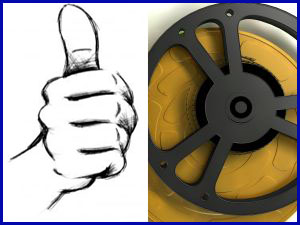 There recently was an online plagiarism fiasco that involved a YouTube movie reviewer ripping off a number of film reviews straight from the website JoBlo.com.
There recently was an online plagiarism fiasco that involved a YouTube movie reviewer ripping off a number of film reviews straight from the website JoBlo.com.
The UK plagiarist, named Tom Perkins, was caught red-handed and admitted to stealing word for word transcripts of a large number of movie reviews and reading them back on his own YouTube show.
The worst part was that Perkins was an official YouTube contributor, which means he was making money by illegally duplicating other people’s hard work.
From joblo.com in response to the incident:
It’s kind of eerie to see that, and personally, as a writer, I just don’t see A) why anyone would fake reviews, as most of us do what we do because we love giving OUR opinions on movies and B) how do you think you’re going to get away with that indefinitely?
This case brings to light the realm of film critics and the danger plagiarism poses to their livelihood. Giving the low-down on recent films has been a long standing tradition; movie reviews provide a great way to catch up on anything from big budget blockbusters to coffee house indie flicks.
Film critics include big names and publications like the Chicago Sun-Time’s Roger Ebert and the New York Time’s A.O. Scott. Small niche publications like online blogs also have taken to giving their unique opinions on films.
The value add of a true film critic is putting a unique spin on a movie. A critic isn’t required to have an un-biased take on a film like the journalists in many other fields. A film critic has the unique ability to tell a story within a story, providing their own creative input on a movie and letting readers decide whether or not to agree with them.
This creativity is exactly why film critics face a growing danger from having their work plagiarized.
Roger Ebert relies on his unique literary voice to distinguish himself from the many other film critics out there. If a plagiarist steals Ebert’s work from under his nose, it greatly diminishes the content’s value.
Not only does plagiarism detract from a film critic’s value, but it also hurt’s the associated publication.
The film review sections in the Chicago Sun-Times or the New York Times are some of the most read and useful parts of these papers. These sections are one of the few places where publications can still distinguish themselves with well known critics and lengthy reviews that offer more substance than a simple ‘thumbs up or down’.
It would behoove any serious film critic or publication to ensure their intellectual property is properly protected by utilizing a plagiarism detection solution to cross check a variety of on and offline sources for any duplicate matches to their work.
It also would make sense that a large publication utilizes a plagiarism checker to ensures no plagiarized film reviews are coming out of their distribution.
A single plagiarized film review could seriously cripple a publication’s reputation.
Citations:
Tassi, Paul “Meet the guy who plagiarized JoBlo.com’s entire review collection in 2010″ Joblo Media Inc. 10 May 2010. http://www.joblo.com/meet-the-guy-who-plagiarized-joblocoms-entire-review-collection-in-2010
Related
Topics: Current Events,Social Media